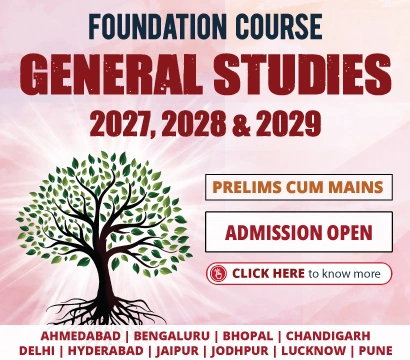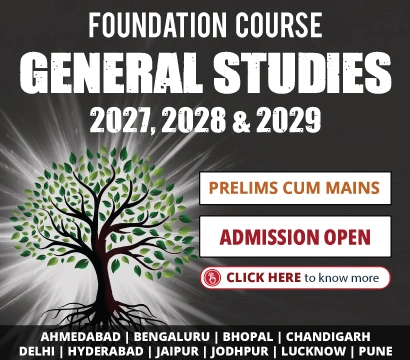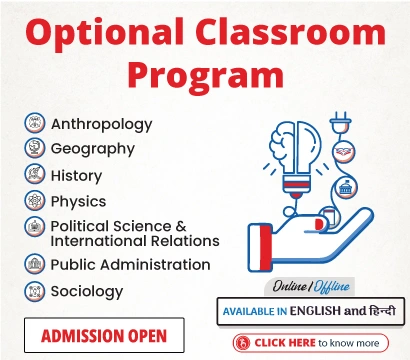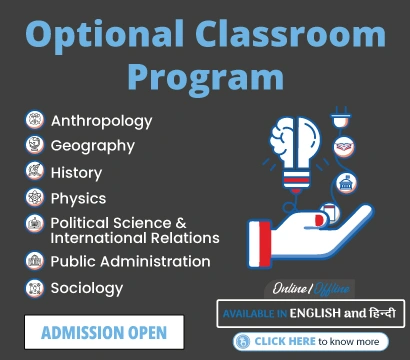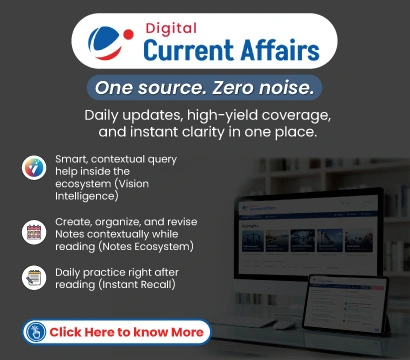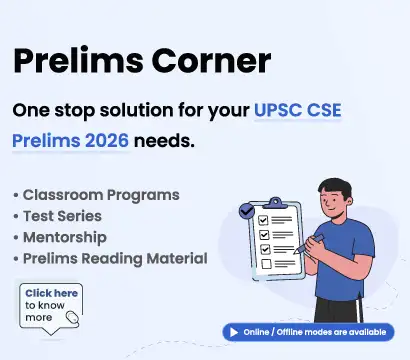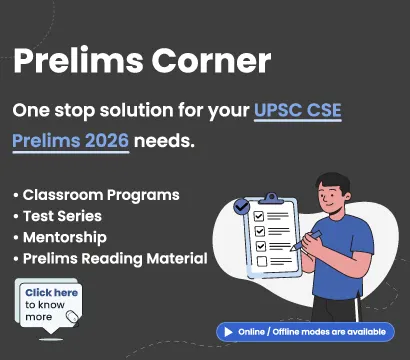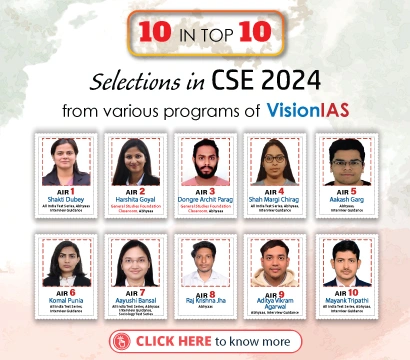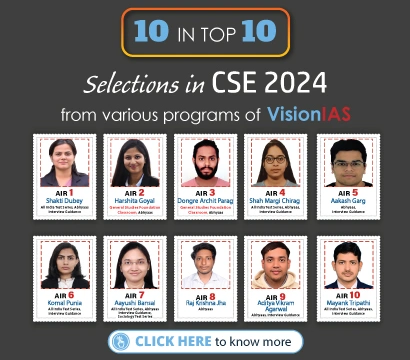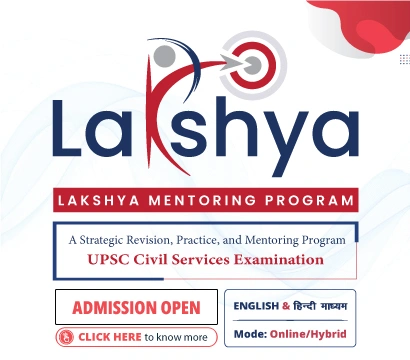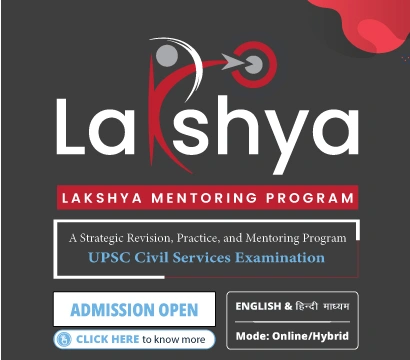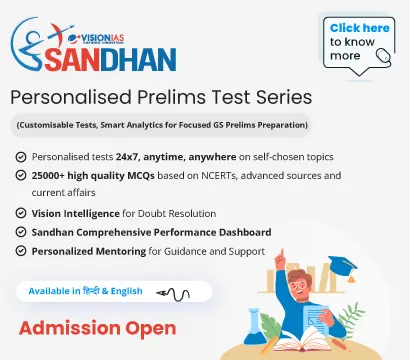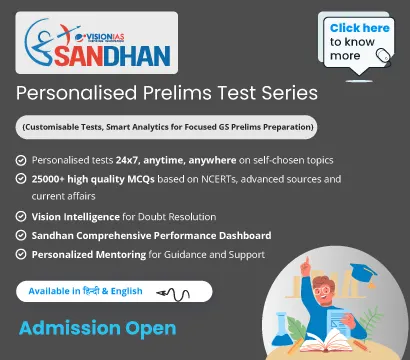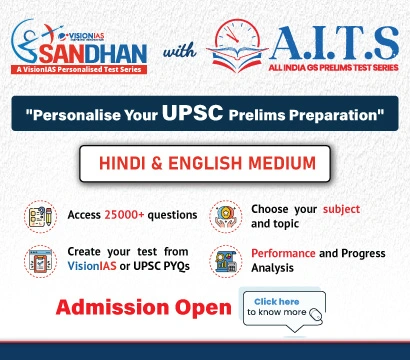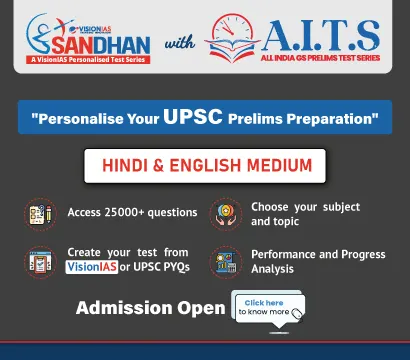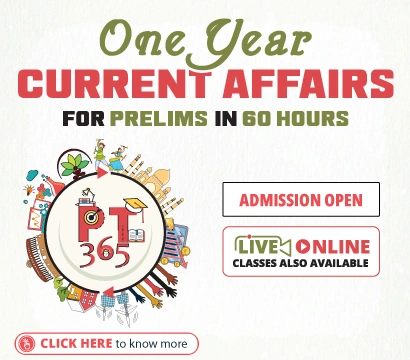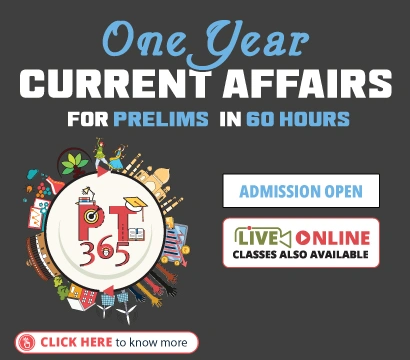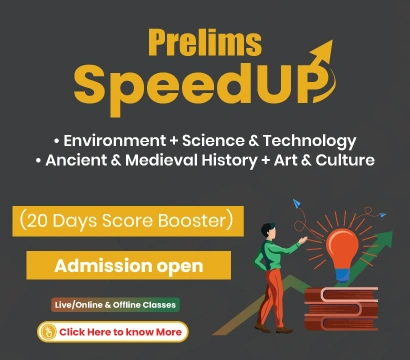Ethics
Insights from Toppers’ Copies: Ethics Answer Writing by Vishakha Yadav, AIR-6, UPSC 2019
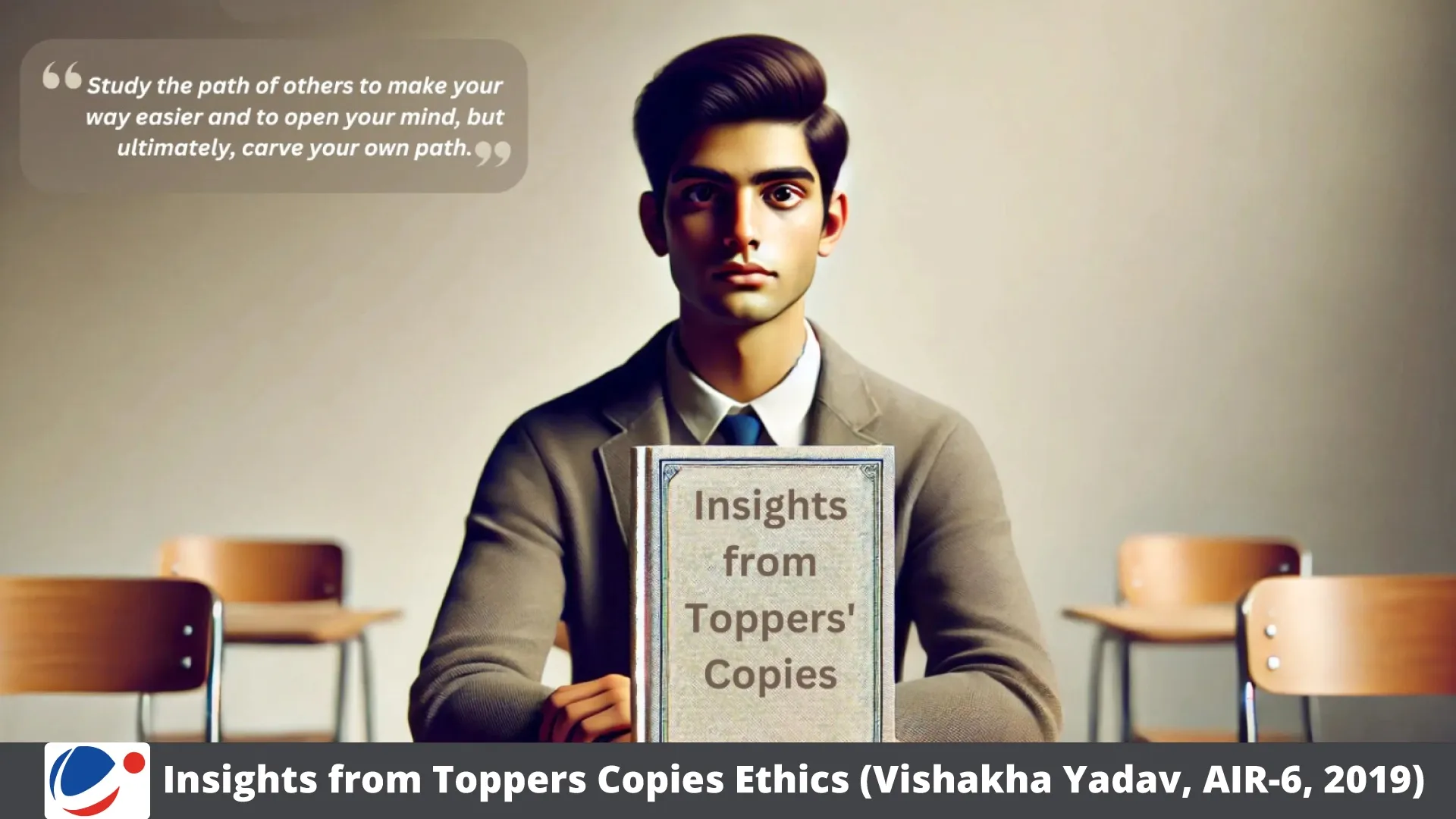
The Ethics paper in the UPSC Civil Services Examination holds immense significance. As part of General Studies Paper 4, it evaluates an aspirant’s moral compass, decision-making skills, and ability to apply ethical reasoning in real-world scenarios. Unlike other papers, it blends theoretical understanding with practical application, making it one of the most dynamic and challenging components of the Mains exam.
Among the select few who excelled in this domain, Vishakha Yadav, AIR-6 in UPSC 2019, stands as an inspiration. She achieved a remarkable 162 marks in Ethics—the highest score so far recorded in the paper since its inception. Her answer-writing style reflects a perfect amalgamation of conceptual clarity, logical reasoning, and impactful presentation, setting a benchmark for aspirants.
This blog dives into the key insights from Vishakha’s answer scripts, offering practical lessons to refine your Ethics paper preparation.
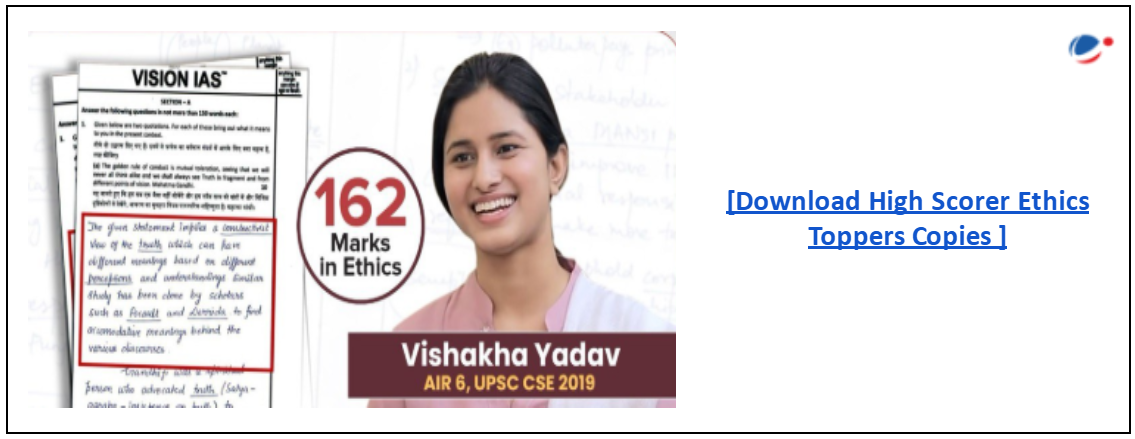
Download High Scorer Ethics Toppers Copies
Useful Insights from Vishakha Yadav’s Ethics Answer Scripts
1. Academic Tilt in Arguments
Vishakha Yadav’s answers demonstrate a strong academic foundation, with arguments deeply anchored in theoretical concepts. The differences between different concepts are very clearly laid out.
For instance, she meticulously distinguishes between ethics and law, explaining how law enforces behavior externally while ethics governs behavior internally through moral reasoning. By weaving these distinctions into her answers, she showcases her ability to create a robust conceptual framework that underpins her reasoning.
Her answers also reflect a logical and structured progression, ensuring that the philosophical principles she employs are relevant and contribute to the depth of her analysis.

This academic rigor highlights the importance of grounding arguments in theoretical understanding. Such an approach not only enriches the content but also demonstrates a nuanced grasp of the subject, helping aspirants craft answers that are both insightful and logically coherent.
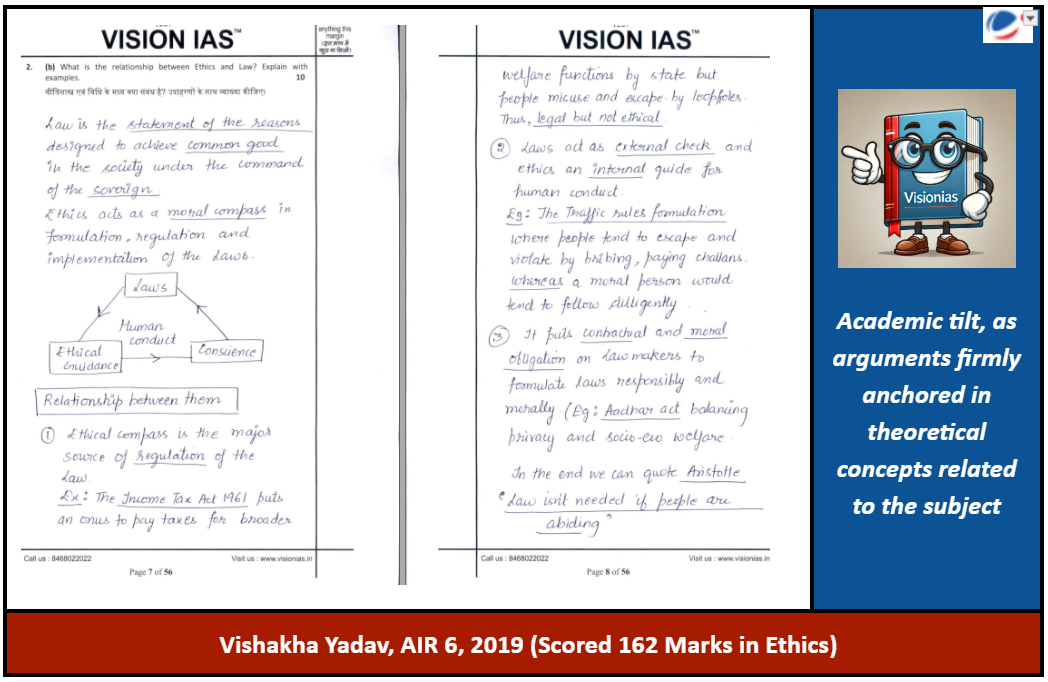
2. Simple Yet Impressive Language
One of the standout features of Vishakha Yadav’s Ethics answers is her ability to simplify complex ideas while retaining their depth.
For example, in her discussion on corporate ethics, she emphasizes the importance of building trust and aligning business practices with the public good without resorting to technical jargon. Her arguments are sharp and to the point, ensuring they remain strictly aligned with the question’s demand.
In addressing ethical concerns, such as transparency in governance or accountability in administration, she uses precise language to frame her arguments, making her answers impactful without overcomplicating them.
This clarity in expression showcases how effective communication lies in simplicity. By focusing on crafting concise and contextually relevant arguments, aspirants can ensure their answers resonate with the examiner while conveying their depth of understanding.
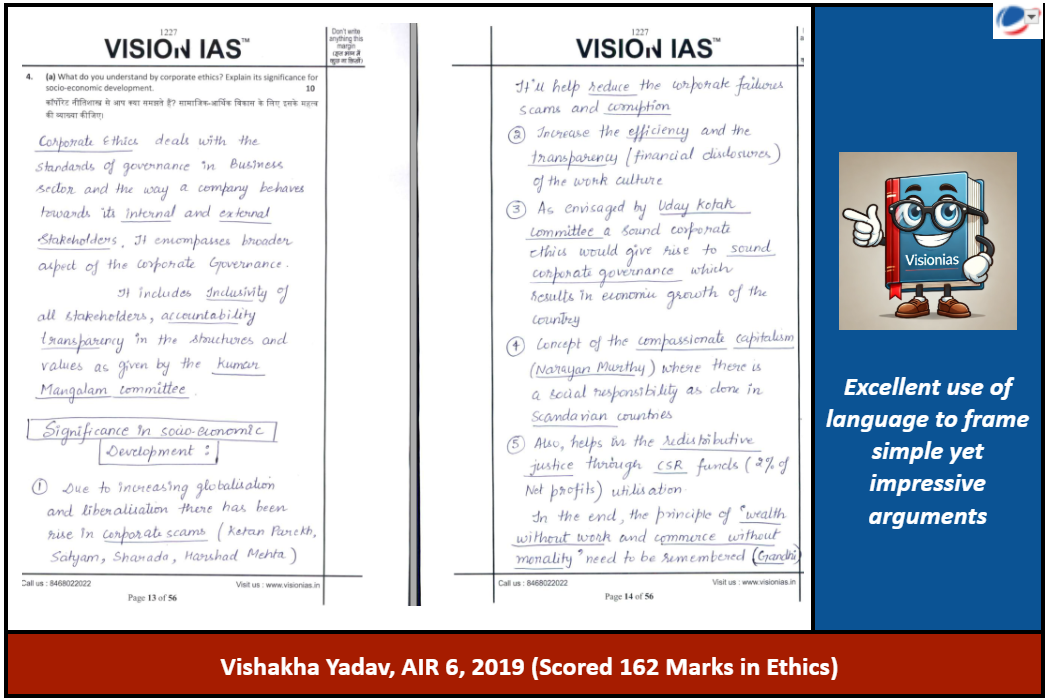
3. Use of Theories and Ethical Ideas of Thinkers
Vishakha Yadav’s answers showcase a profound understanding of ethical theories and the ideas of renowned thinkers, which she skillfully integrates to substantiate her arguments.
For instance, in response to questions discussing the dichotomy between means and ends, she contrasts the deontological views of Kant and Gandhi, which emphasize the morality of means, with the teleological perspectives of Bentham and Mill, which focus on the justification of ends. Similarly, she references ethical ideas of thinkers like Machiavelli to highlight how ethical lapses in political power compromise governance.
This strategic use of moral theories and thinkers’ ethical ideas adds depth to her answers, making her arguments more credible and nuanced. It underscores the importance of grounding ethical discussions in well-established frameworks to enrich the quality of answers.
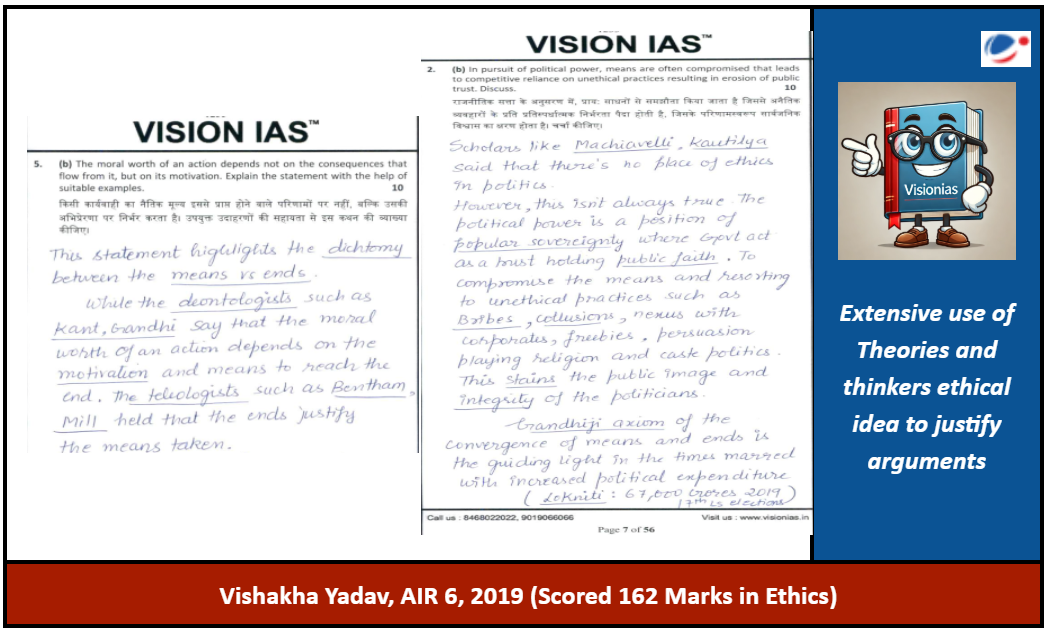
4. Analyzing Quotes with Meaning and Relevance
Vishakha Yadav’s approach to quote-based questions demonstrates her ability to balance theoretical meaning with contemporary relevance.
For instance, when interpreting a quote on truth and tolerance, she applies a constructivist perspective by referencing scholars like Foucault and Derrida to explore varied interpretations. Furthermore, she connects the quote to modern societal challenges, such as religious intolerance and lynchings, emphasizing the critical need for mutual respect and pluralism in today’s Indian society.
This dual emphasis on philosophical depth and current applicability ensures that her answers are comprehensive and resonate with the ethical dimensions of present-day challenges.
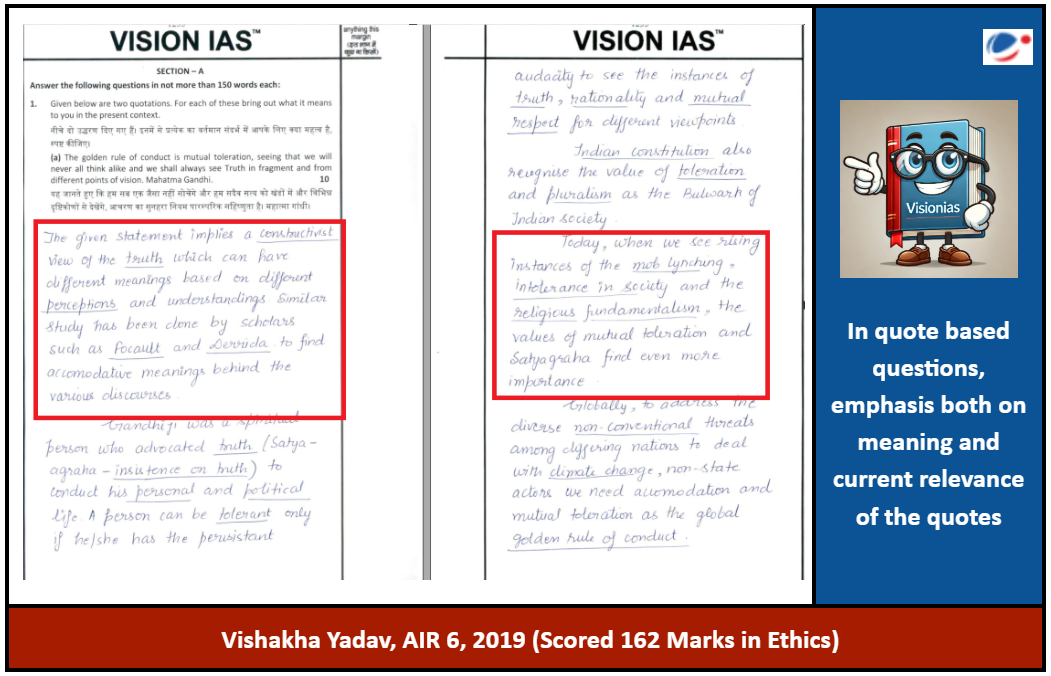
5. Linking Arguments to Contemporary Issues
Vishakha Yadav skillfully grounds her ethical arguments in contemporary issues, making her answers highly relevant and relatable.
For instance, in her discussion on socio-economic disparities and corruption, she highlights India’s Transparency International ranking and connects it to the unequal wealth distribution within the country. Furthermore, she draws global parallels, such as the higher corruption levels in countries with lower HDI like Afghanistan and the contrasting governance models in Scandinavian countries, which demonstrate the correlation between equitable wealth distribution and reduced corruption.
This approach of integrating current events and global comparisons adds depth to her answers, emphasizing the importance of staying updated and weaving real-world examples into ethical discussions.
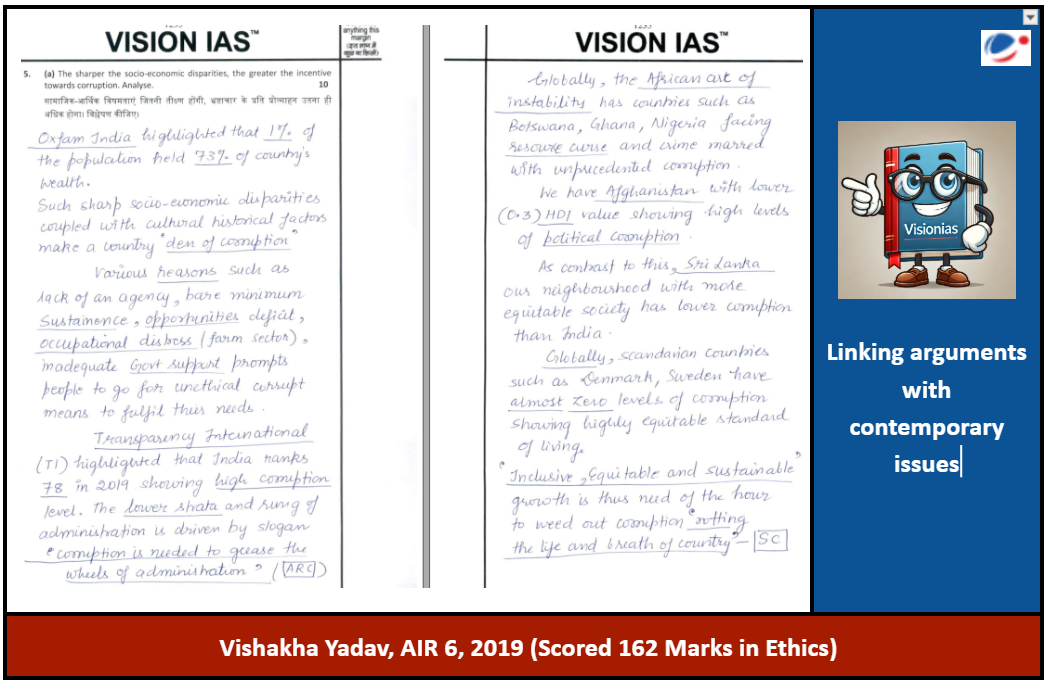
6. Logical Flow, Examples and Structured Presentation
Vishakha Yadav’s answers reflect a clear and logical structure, with each argument seamlessly connected to the next and supported by relevant examples.
For instance, in her discussion on declining ethical standards in public services, she identifies problems like the “sanskritization of corruption” and the erosion of public faith in administration, citing examples like misuse of MPLADS funds. She then outlines actionable solutions, such as introducing a Code of Ethics, leveraging behavioral economics through “Nudge Theory,” and implementing grievance redressal mechanisms using digital technology, making her answers both practical and comprehensive.
This logical flow and well-structured presentation enhance the clarity of her answers, ensuring that her ethical reasoning and solutions are communicated effectively to the examiner.
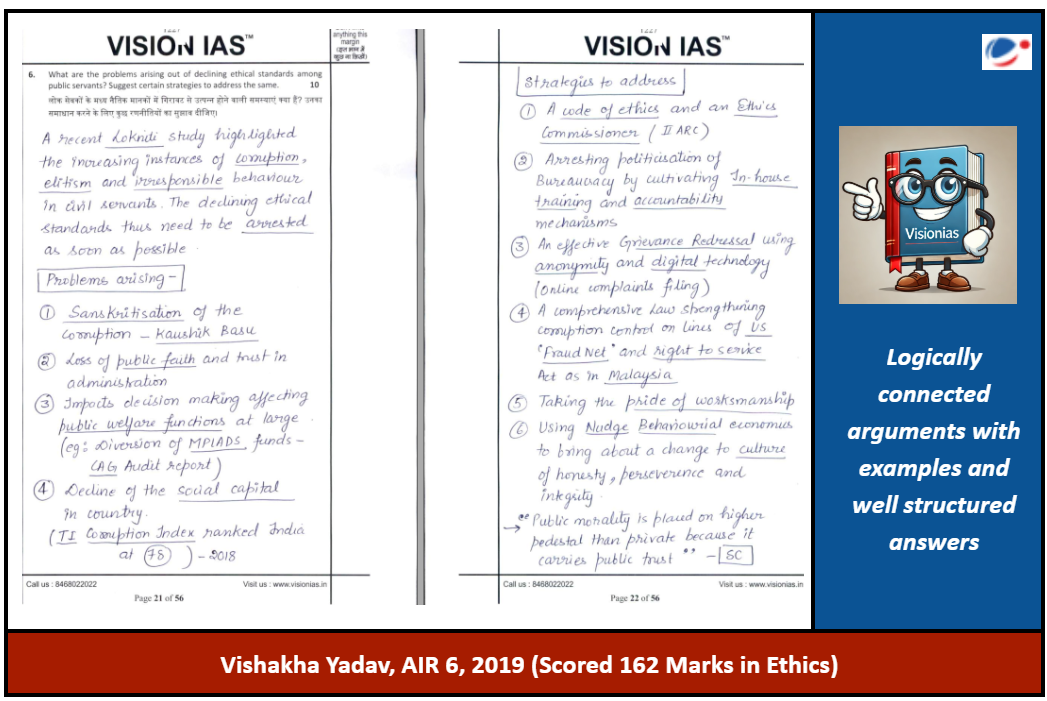
7. Contextual Introductions in Case Studies with strong focus on Reasoning
Vishakha Yadav’s approach to case studies reflects her ability to create a strong foundation by providing a clear contextual introduction.
For instance, In a case involving bonded labor in an agricultural district, she begins by emphasizing human dignity and freedom as integral to the right to life, referencing Article 23 of the Constitution, which prohibits any form of forced labor. This ethical and legal grounding highlights the moral significance of the issue while framing her analysis in a structured and reasoned manner.
Her course of action is backed by strong reasoning, addressing the stakeholders’ interests while ensuring practical and ethically sound solutions. This ensures that her choices are implicitly understandable and aligned with the ethical demands of the case.
This approach to case studies demonstrates the importance of starting with a contextual introduction that clarifies the ethical dimensions, enabling a logical and transparent flow of analysis.
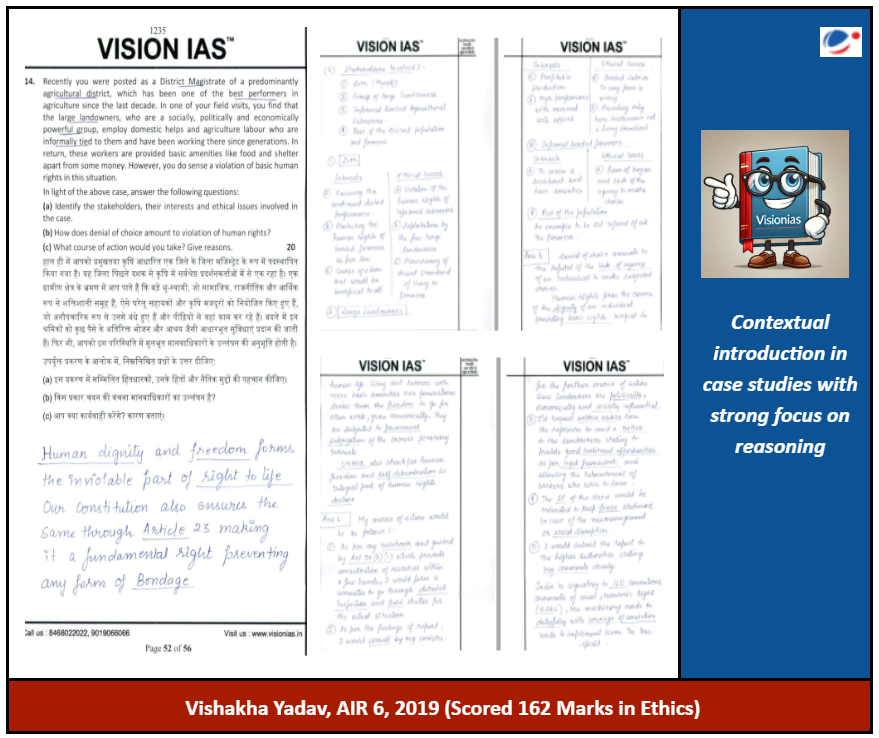
8. Precision in Underlining Key Ideas
Vishakha uses underlining strategically to draw attention to key points in her answers. For instance, she highlights critical phrases or key terms like “common good” and “public interest” to ensure that the examiner easily grasps the essence of her arguments.
This conscious use of underlining enhances the overall presentation, making it easier for the examiner to evaluate the answer.
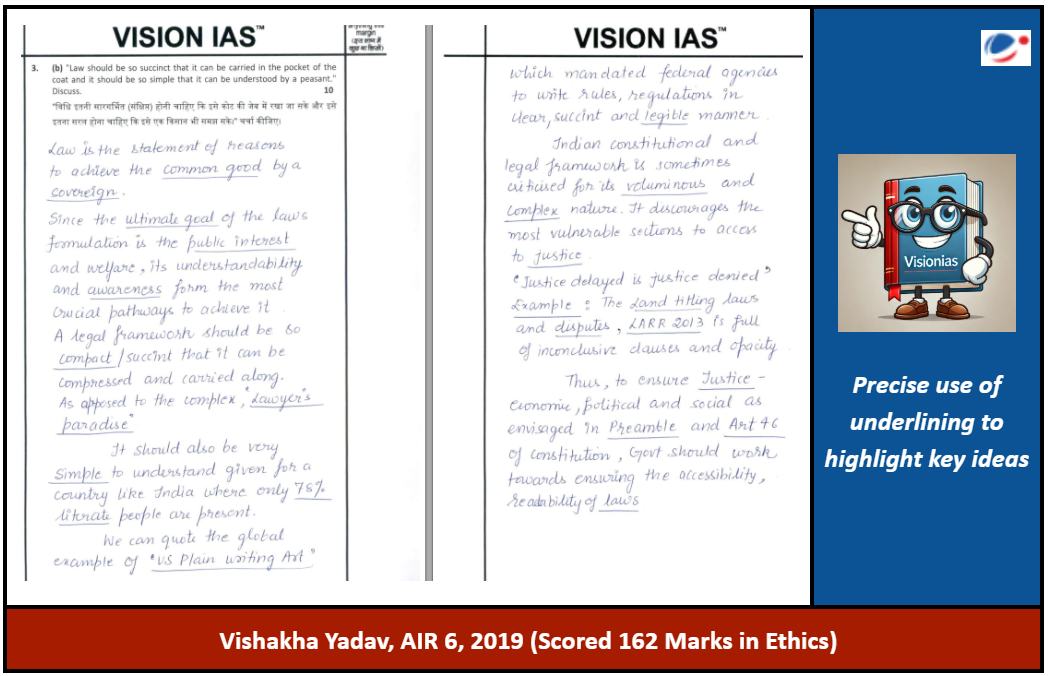
Watch: Insights from Toppers’ Copies on Ethics Answer Writing
Charting Your Path to Ethics Excellence
Vishakha Yadav’s Ethics answer-writing strategies exemplify excellence in UPSC preparation. Her academic rigor, clarity of expression, and structured presentation make her a role model for aspirants aiming to ace GS Paper 4. By incorporating her techniques—strong theoretical grounding, contemporary relevance, and logical structure—you can elevate the quality of your Ethics answers.
Mastering the Ethics paper requires consistent practice, clear reasoning, and a commitment to improving your writing skills. To support you in this journey, VisionIAS offers specialized Ethics programs designed to refine your skills, tackle challenges with precision, and help you write answers that align with UPSC standards.
All India Ethics Test Series and Mentoring Program: Refine your skills with a series of meticulously designed sectional & Full length tests that focus on ethical concepts, contemporary relevance, and case study practice. Detailed feedback and personalised mentoring to ensure targeted improvement.
Register: All India Ethics Test Series 2025
Ethics Case Studies Classes: Master the art of case study writing with interactive classes and intensive practice sessions. Learn to approach contemporary ethical dilemmas with sound reasoning and actionable solutions tailored to UPSC demands.
Advance Course for GS Mains: Build a strong foundation with structured classes with strong focus on Ethics that enhances conceptual clarity and analytical abilities. Benefit from focused answer-writing practice and one-on-one mentorship to refine your approach and boost your performance.
Take inspiration from Vishakha’s journey and start applying these strategies in your preparation today. With determination and practice, you too can excel in this critical paper and move closer to your goal of becoming a civil servant.




























